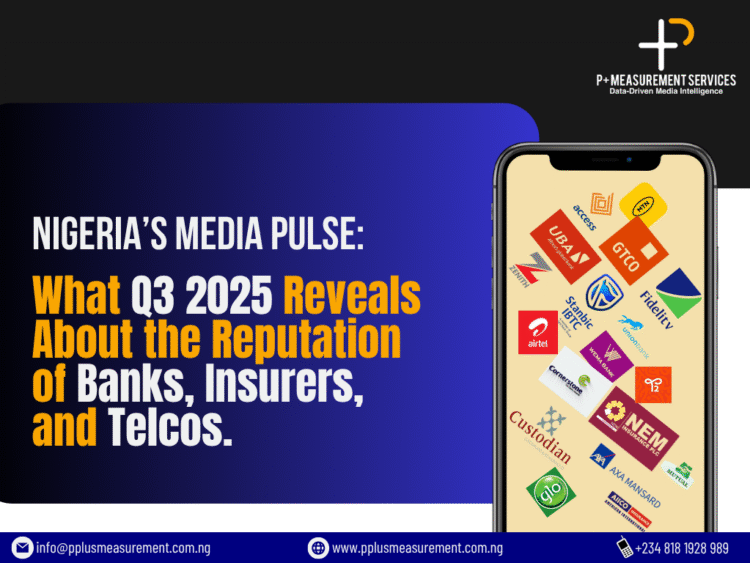As Nigeria’s media environment continues to evolve, brand sentiment has emerged as a key indicator of reputation, revealing how corporate narratives influence public confidence, trust, and market perception.
A new report by P+ Measurement Services, Nigeria’s leading independent media intelligence consultancy, provides a data-backed analysis of how reputational factors shaped public narratives across the banking, insurance, and telecommunications sectors in the third quarter of 2025.
The Q3 2025 Sentiment Report draws insights from over 1.3 million online publications, including news platforms, financial websites, forums, and blogs, alongside approximately 2,100 print publications across daily, weekly, and monthly editions. Using a sentiment-based evaluation framework, the study identifies how tone, visibility, and perception influenced brand equity across major industries.
Commercial Banking: Innovation, CSR, and Financial Stability Drive Positive Visibility
Nigeria’s banking sector recorded a strong positive sentiment profile in Q3 2025, largely shaped by innovation, governance, and social impact initiatives.
Stanbic IBTC Bank led with 26% positive sentiment, boosted by its ₦800 million loan facility from the China Development Bank and recognition as West Africa’s Best Trade Finance Bank, both of which strengthened investor confidence.
Zenith Bank followed with 23%, supported by its 35th anniversary celebrations, EuroMoney Award for Excellence, and sustained media coverage highlighting corporate stability.
Fidelity Bank sustained 19% positive sentiment through community-driven CSR projects such as solar-powered school bag donations and food relief programmes, aligning profitability with purpose.
FirstBank achieved 17%, driven by financial inclusion campaigns and partnerships promoting digital accessibility, while FCMB recorded 15%, buoyed by initiatives supporting women entrepreneurs and sustainable finance.
However, reputation risks persisted. UBA accounted for 36% of negative sentiment, linked to reports of fire incidents, regulatory scrutiny, and operational disruptions. Zenith Bank followed with 21%, tied to customer service complaints and system downtime, while Union Bank (18%) and Sterling Bank (16%) faced ownership transition issues and digital service challenges, respectively. Ecobank
Insurance: Advocacy, Performance, and Market Perception Shape Reputation
Sentiment in the insurance industry reflected a more complex mix of public advocacy, market discipline, and investor confidence.
AXA Mansard Insurance emerged as the most visible brand, with 37% positive sentiment, driven by its gender advocacy campaign involving 900 employees and recognition as Insurance Company of the Year.
Leadway Assurance followed with 29%, supported by partnerships with Ecobank and state governments on climate-resilient insurance initiatives. AIICO Insurance (14%) maintained visibility through annuity engagement and sustainability-focused programmes, while Stanbic IBTC Insurance Limited (11%) deepened post-retirement trust through retirees’ engagement forums. SanlamAllianz Nigeria Insurance (9%) reinforced its youth-focused positioning through storytelling and essay competitions.
Negative sentiment was largely market-driven. AXA Mansard recorded 69% negative sentiment following reports of a sharp half-year financial decline and its perceived role in the NGX downturn. AIICO Insurance accounted for 31%, tied to investor caution and sell-offs within the insurance index. In contrast, Leadway Assurance, Stanbic IBTC Insurance, and SanlamAllianz maintained z
Telecommunications: Innovation and Infrastructure vs. Service Reliability
Nigeria’s telecommunications sector continued to attract significant media attention, balancing innovation-led visibility with persistent concerns about service reliability.
MTN Nigeria led with 47% positive sentiment, driven by its $120 million data centre launch and its entertainment collaboration with Ultima Studios on The Next Afrobeats Star, both reinforcing its digital inclusion and youth engagement agenda.
Globacom followed with 24%, buoyed by its 22nd anniversary celebrations, infrastructure expansion, and the introduction of a device protection service enhancing customer retention.
T2 (formerly 9mobile) achieved 16%, supported by its rebranding and repositioning drive, while Airtel Nigeria recorded 13%, reflecting growing confidence in its 5G rollout and broadband expansion projects.
On the negative side, MTN Nigeria also dominated unfavourable coverage with 68% negative sentiment, tied to regulatory penalties over unsolicited caller tunes and fibre cuts disrupting nationwide connectivity. T2 (9mobile) followed with 16%, facing backlash for network issues, while Globacom recorded 14%, linked to subscriber losses and legal disputes. Airtel Nigeria stood out with only 2% negative sentiment, signalling operational resilience and customer satisfaction stability.
Strategic Insight: Reputation is the New Balance Sheet
The Q3 2025 sentiment outlook underscores a clear divide between organisations that sustained trust through innovation, transparency, and stakeholder engagement, and those whose reputations were challenged by regulatory, operational, or service setbacks.
According to P+ Measurement Services, long-term reputational resilience in Nigeria’s corporate landscape will depend on three key factors:
- Credibility – Consistent and transparent communication.
- Responsiveness – Timely management of public and media narratives.
- Reformability – Turning challenges into opportunities for renewed trust.
As the firm notes, “Reputation is no longer a soft metric, it is a measurable, strategic asset that directly impacts market confidence and business continuity.”









